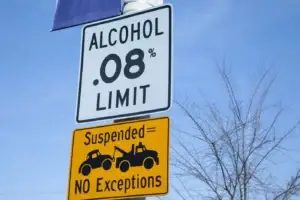When most people think about a DUI charge, they picture a one-time mistake that might carry a fine or a few points on their license. In reality, Colorado DUI sentencing is one of the toughest in the country, and probation is almost always part of the package. What’s more, the penalties stack up quickly as prior convictions add up.
In this post, we’ll walk through what sentencing looks like for DUI convictions, what probation involves, and why understanding county-specific rules in Denver, Aurora, Arapahoe, Adams, Douglas, and Jefferson Counties can make a big difference in your case.
The Sentencing Structure in Colorado
Colorado law imposes mandatory minimum sentences for DUI convictions. Judges don’t have discretion to go below these numbers, though they often add penalties above them. Here’s the basic breakdown:
Even though a first offense may not include jail, probation itself can feel restrictive and expensive. Courts in Denver, Arapahoe County, and Adams County routinely add probation, community service, alcohol classes, and monitored sobriety to even first-time cases.
Probation Basics
Probation is essentially court-ordered supervision in the community. Instead of serving a full jail sentence, the defendant agrees to follow strict rules and check in with a probation officer.
Standard Terms of DUI Probation in Colorado
Do not commit new crimes.
Do not drive without a valid license.
Get permission before leaving Colorado.
Comply with probation officer check-ins, usually monthly.
In some cases, restrictions on firearm ownership.
The rules may sound straightforward, but even minor violations can trigger a probation violation hearing. Judges in Aurora or Jefferson County can then impose the suspended jail time in full.
DUI-Specific Probation Requirements
What makes Colorado DUI probation especially difficult are the alcohol and drug-related conditions. These go far beyond the standard terms:
Sobriety monitoring – Random urinalysis or breath testing.
SCRAM device – A tamper-proof ankle monitor required for repeat offenders, which detects alcohol in sweat.
Community service – A first DWAI may require 24–48 hours, while a second or third DUI can reach up to 120 hours.
Alcohol education classes – Level 2 alcohol education (12 weeks) followed by therapy, with length determined by BAC and prior history.
MADD Victim Impact Panel – A required session where defendants hear directly from victims of drunk driving.
Each county enforces these rules slightly differently. For example, Douglas County often emphasizes monitored sobriety, while Adams County tends to impose heavier community service requirements.
How Long Does DUI Probation Last?
The length of probation depends on your history:
First offense DUI probation – Typically one year, sometimes extended to 18 months.
Second or subsequent DUI probation – Mandatory two years. Courts also suspend one year of jail if probation is completed successfully.
Judges in Denver County are known for longer probation terms, while Jefferson County courts in Golden often tie probation length to blood alcohol levels in the case.
Can You End Probation Early?
Yes—but it’s not automatic. Early termination of DUI probation in Colorado depends on completing all requirements first: community service, alcohol classes, monitored sobriety, and fines.
Arapahoe County courts often require at least half of probation served.
Jefferson County sometimes considers early termination after six months.
Denver judges usually want input from the probation officer before deciding.
This is where having a Colorado DUI defense attorney can help. An attorney can file the motion, coordinate with probation officers, and present evidence of compliance.
Probation Transfers Between Counties
Colorado residents frequently face a DUI in one county but live or work in another. Transfers are possible, but the rules vary:
Arapahoe to Douglas County transfers are usually straightforward.
Denver probation transfers can be difficult because Denver has fewer reciprocal agreements.
Many counties use private probation companies such as Rocky Mountain Offender Management, which supervise probation across county lines for a fee.
If you live in Aurora but your case is in Adams County, or vice versa, it’s important to request the transfer early so you don’t miss check-ins.
The Cost of DUI Probation
Probation is not free. In fact, it often feels like “death by a thousand cuts”:
Monthly probation supervision fees.
Random testing fees for monitored sobriety.
SCRAM device rental and maintenance costs.
Alcohol class tuition.
Community service program fees in some counties.
Defendants in Denver and Aurora DUI cases often find that finishing classes and service quickly helps shorten probation and reduce these ongoing costs.
County-Specific Differences
While state law sets the framework, local practices matter:
Denver (Lindsey-Flanigan Courthouse) – Heavy caseloads, strict compliance checks.
Arapahoe County Justice Center – Judges often push for intensive alcohol education.
Adams County Justice Center – Known for stricter jail sentences beyond mandatory minimums.
Douglas County Justice Center – Strong focus on sobriety monitoring and SCRAM devices.
Jefferson County Courthouse – Judges frequently link probation length to BAC results.
Understanding these local quirks can help you anticipate what probation will look like in your county.
Why Probation Compliance Matters
Violating probation can be worse than the original sentence. If a defendant misses classes, fails a sobriety test, or gets another ticket worth more than 7 points, probation officers will report it. Judges can then:
That’s why probation compliance isn’t just a technicality—it’s often the difference between staying free or going back to jail.
Takeaways
Here are the main points to remember about Colorado DUI probation:
Sentences get harsher with each conviction: no jail for a first offense, but at least 10 days for a second and 60 days for a third.
Probation is mandatory in almost all DUI cases, even first offenses.
Specific requirements include sobriety monitoring, alcohol education, therapy, community service, and possibly a SCRAM device.
Early termination is possible, but only after demonstrating compliance.
Probation transfers are allowed, but Denver makes the process harder than most counties.
Costs add up quickly, making probation financially burdensome.
Final Thoughts
Probation may seem like a break compared to jail, but in practice it is strict, expensive, and time-consuming. If you’re facing a DUI in Denver, Aurora, Arapahoe, Adams, Douglas, or Jefferson County, understanding what probation really involves is key to preparing yourself.
Each county enforces probation differently, and each judge brings their own expectations. Knowing what to expect—and how to comply—can make the process smoother and increase your chances of finishing probation early.
Even if this is your first offense, it’s wise to talk with a Colorado DUI defense attorney. They can explain how sentencing works in your specific court, help you plan for probation requirements, and guide you toward the best possible outcome.








